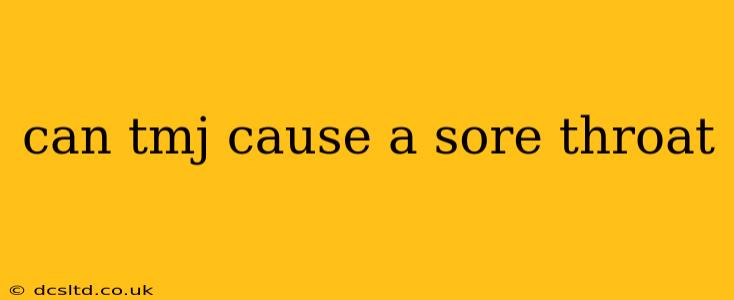Temporomandibular joint (TMJ) disorders affect the jaw joint and surrounding muscles, causing pain and discomfort. While not directly causing a sore throat in the traditional sense (like a viral infection), TMJ dysfunction can lead to symptoms that feel like a sore throat, creating confusion and concern. This article explores the potential link between TMJ and sore throat sensations, addressing common questions and providing clarity.
How Can TMJ Mimic a Sore Throat?
The connection isn't a direct causal link like a virus infecting the throat. Instead, the discomfort stemming from TMJ can manifest in ways that are easily mistaken for a sore throat. Here's how:
-
Referred Pain: TMJ pain often radiates to other areas. The muscles and nerves in the jaw are closely interconnected with those in the neck, throat, and even the ears. Pain originating in the TMJ can be perceived as pain or discomfort in the throat, mimicking a sore throat. This is known as referred pain, a common phenomenon where pain is felt in a location different from its source.
-
Muscle Tension: TMJ disorders frequently involve significant muscle tension in the jaw, neck, and shoulders. This tension can extend to the muscles surrounding the throat, causing stiffness, tightness, and a feeling of soreness. Chronic clenching or grinding of teeth (bruxism), common with TMJ, exacerbates this muscle tension.
-
Inflammation: Inflammation in the TMJ can lead to referred inflammation in nearby areas, including the throat. This inflammation can contribute to the sensation of a sore throat.
What Are the Symptoms of TMJ?
Recognizing TMJ symptoms is crucial to differentiate them from a true sore throat. Common symptoms include:
- Jaw pain: This is often the most prominent symptom, affecting one or both sides of the jaw.
- Jaw clicking or popping: Noises emanating from the jaw joint during movement.
- Limited jaw movement: Difficulty opening or closing the mouth fully.
- Headaches: Often tension headaches or migraines.
- Earaches: Pain or discomfort in the ear(s).
- Neck pain: Stiffness and pain in the neck and shoulders.
- Facial pain: Pain in the cheeks, temples, or face.
Can TMJ Cause Difficulty Swallowing (Dysphagia)?
While not directly causing a sore throat, severe TMJ cases can sometimes lead to difficulty swallowing, or dysphagia. This is usually due to the referred pain and muscle tension impacting the muscles involved in swallowing. If you experience difficulty swallowing alongside TMJ symptoms, it's crucial to consult a medical professional.
How is TMJ Diagnosed?
A dentist or other healthcare professional specializing in TMJ disorders can diagnose the condition through a thorough examination, including a review of symptoms, a physical examination of the jaw joint, and potentially imaging studies such as X-rays or MRIs. Early diagnosis is essential for effective management.
How is TMJ Treated?
Treatment for TMJ varies depending on the severity and underlying cause. Options include:
- Lifestyle changes: Stress management techniques, improving posture, and dietary adjustments.
- Medications: Pain relievers, muscle relaxants, or anti-inflammatory drugs.
- Physical therapy: Exercises and stretches to strengthen jaw muscles and improve range of motion.
- Oral appliances: Mouthguards or splints to reduce teeth grinding and improve jaw alignment.
- Injections: Corticosteroid injections to reduce inflammation.
- Surgery: In rare cases, surgery may be necessary.
When Should I See a Doctor?
If you're experiencing persistent jaw pain, headaches, or throat discomfort that you suspect might be related to TMJ, it's important to seek professional medical advice. A healthcare professional can accurately diagnose the cause of your symptoms and recommend the appropriate treatment. Don't delay seeking help if your symptoms are severe or interfere with your daily life.
Disclaimer: This information is for educational purposes only and does not constitute medical advice. Always consult with a qualified healthcare professional for diagnosis and treatment of any medical condition.
